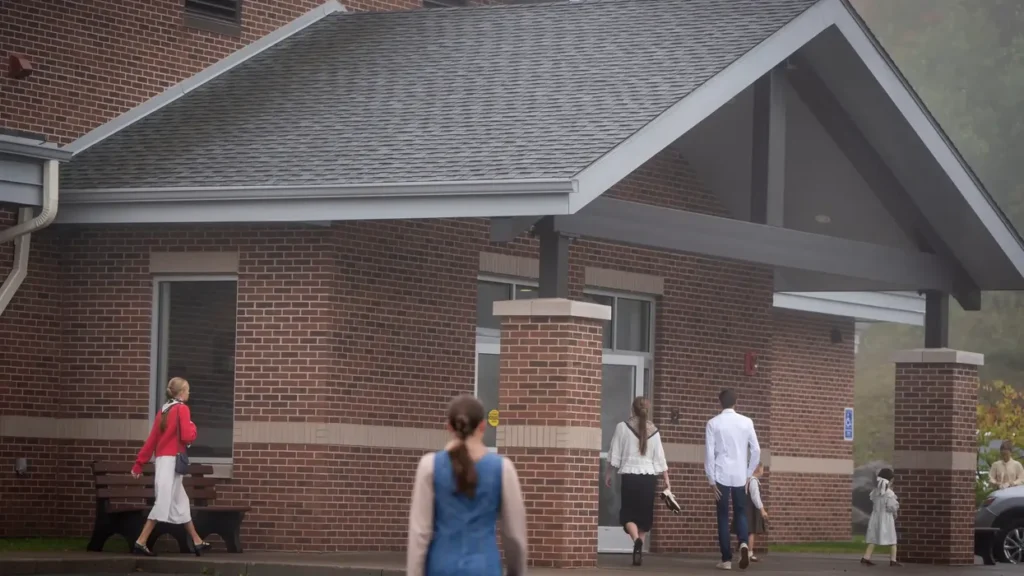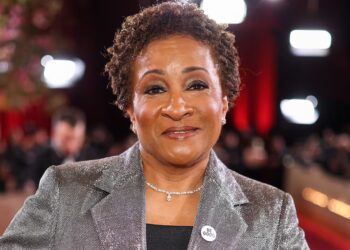The girl pleaded not to go.
She fought with her father on the drive over, screaming and crying in his truck until they arrived at the office building for Bruckelmyer Brothers, a home construction company on the outskirts of Duluth, Minnesota. She was just entering her first years of grade school.
In the office, two men were waiting. One of them was Clint Massie, who the girl had recently told her parents had touched her genitals and groped her under her shirt. The other was Daryl Bruckelmyer, a preacher and leader of the Old Apostolic Lutheran Church down the road, where the girl’s family worshipped. Massie was a respected member of the congregation. Bruckelmyer had asked them all to the meeting, according to the girl’s account to police years later.
In front of the girl, her father and Bruckelmyer, Massie asked her for forgiveness. Looming over her, the three men wept. Then the girl’s dad and preacher allowed the man who had been sexually abusing her since kindergarten to hug her.
“It was one of the worst things ever,” she told police some 15 years later.
In accordance with one of the core tenets of their church, the matter was resolved. It was forgiven. It should now be forgotten. If she spoke of it again, she would be guilty of having an unforgiving heart and the sins would become hers.
But she could never forget. And neither could the other children.
Over the course of about 20 years in two states, Massie had, according to court documents and by his own admission, sexually abused children within the Old Apostolic Lutheran Church, or OALC, community. He touched girls under blankets when their parents were present, in the backseat of a car with other passengers — even in the pews at church. His abuse was such an open secret among the tight-knit congregation that mothers warned their daughters to stay away from him.
Some former victims, as adults, confronted preachers, including Bruckelmyer, about what Massie had done to them. Church leaders told Massie to stay away from the congregation’s children, and they sent him to a therapist who specialized in sex offender treatment.
But they never reported Massie’s crimes to police, as required by the law. Instead, Bruckelmyer and other leaders in the church encouraged the victims to take part in forgiveness sessions — which allowed Massie, now 50, to continue abusing children, according to an investigation by the Minnesota Star Tribune and ProPublica.
Massie did not respond to requests for comment but has denied abuse allegations relating to some individual victims in pending lawsuits. In December 2024, he pleaded guilty to four counts of felony criminal sexual conduct with victims under the age of 13. In March, a judge sentenced him to 7 1/2 years in prison. Church officials, including Bruckelmyer, were not charged in connection with Massie’s crime, but prosecutors said they should have done more to stop him.
“It gives the appearance of a group of people who are not just trying to protect someone — but something,” Mike Ryan, the St. Louis County assistant district attorney who prosecuted Massie, said at his sentencing. “And they have enabled something awful here.”
Law enforcement there first became aware of the allegations against Massie in 2017. They said that the church’s lack of cooperation — including pressuring potential witnesses and victims to stay quiet about the abuse and preachers failing to report it to authorities — was a major factor in the delay in bringing charges.
Bruckelmyer declined to comment or to answer a detailed list of questions. But in a 2023 interview with a St. Louis County detective, he acknowledged knowing about Massie’s sexual abuse and didn’t dispute that he took part in forgiveness sessions involving Massie and his victims.
He said it was up to the victims to report the crimes to police, a clear misreading of the law for mandated reporters — doctors, teachers and others who are required to report crimes against children.
“We don’t protect either one,” Bruckelmyer said of sexual abusers and their victims.
Bruckelmyer also told police his actions followed church protocol. An internal church document, obtained by the Star Tribune and ProPublica, suggests that, when appropriate, church leaders and others facilitate “a conversation with both parties together” — an action that experts who work with abuse victims say can add to a victim’s trauma. While the document praises the police and the justice system, it doesn’t mention mandatory reporting laws and gives preachers wide latitude on whether to involve police.
Kimberly Lowe, a lawyer and crisis manager for the church, said its preachers are unpaid and therefore might not be legally required to report sexual abuse of children. Asked if she believes the preachers are mandated reporters under Minnesota law, Lowe would only say that the language of the statute is unclear.
Bruckelmyer’s church, Woodland Park, is one of two OALC congregations north of Duluth, in the bluff region above Lake Superior. Some members live nearby, in a rural, forest-lined community. Members are not obviously identifiable by their clothing — they dress modestly but modernly, in muted colors and long skirts. Women do not wear makeup, jewelry or open-toed shoes and they keep their hair up in a bun, giving rise to the nickname “bunners.” According to church literature, members are to live simple, modest lives like Jesus did; television, music and dancing are seen as sinful, according to former members.
On a recent Sunday, the modern, unadorned sanctuary of the Woodland Park church, which seats 1,000, was full of families, parents soothing babbling and crying infants, older children clutching baggies of candy or toy cars.
At the close of the sermon, the preacher asked the entire congregation for forgiveness, which kicked off “movements” — a portion of the service when congregants embraced and begged one another for forgiveness for various sins, frequently in tears.
OALC is a conservative Christian revival movement that came to the U.S. with 19th-century settlers from Norway, Finland and Sweden, and it is not affiliated with any mainstream Lutheran denominations. There is no official count, but one academic study estimated 31,000 members worldwide as of 2016, with most in the United States. The church is rapidly growing, experts say, and the member count today is likely much higher. OALC’s emphasis on large families has created booms in places like Washington state and Duluth.
There are 33 OALC churches in the U.S. and Canada. Only men hold leadership positions. The less formal nature of OALC structure — a spokesperson said there’s no headquarters in the U.S. — means that, unlike sexual abuse scandals in the Catholic Church or Southern Baptist Convention, there’s no central authority to hold accountable. Still, news of the criminal case against Massie spread widely in the insular OALC, inspiring more victims to come forward in Minnesota and other states.
St. Louis County investigators say they have been contacted by current and former church members in South Dakota and Washington who allege they were victims of sexual abuse that was never reported to law enforcement. The Star Tribune and ProPublica have interviewed more than a dozen alleged victims of Massie and of other church members in Wyoming, Maryland and Michigan.
By forgiving men like Massie, prosecutors and police said, preachers created a situation where the alleged victims had to worship next to their alleged abusers — and allowed Massie to escape arrest and prosecution for years.
“He was so brazen about it — and there was so little done about it — that he thought it was permission,” Ryan said.
“Church Knows”
For the girl who said she was pressured to forgive Massie at Bruckelmyer’s office, the silence that followed only compounded her trauma. She reported struggling with debilitating anxiety and obsessive-compulsive disorder in her teens. She grew tense every time she walked into the church, especially when she saw Massie holding another little girl.
“I lived in darkness for so many years of my life because I couldn’t talk about it,” the girl said in a recorded interview with police. “Multiple times in my life I wanted to die.”
When she was 16 and in counseling, she told her therapist how Massie had abused her. The therapist reported it to the police, which is how the St. Louis County Sheriff’s Office in Duluth first learned about Massie in summer 2017.
Sgt. Jessica LaBore was the investigator assigned to the case. In a recorded interview, the girl reluctantly told LaBore how she used to sit with Massie and his wife, Sarah, at church, just a few rows from the front. Massie would snake his hands up her skirt and touch her thighs and genitals. Another time, at a gathering at the home of her parents’ friends, she said, Massie told her to get a blanket and began touching her underneath it, with her mom and dad nearby.
She told LaBore that she’d reported the abuse to a preacher, Calvin Raisanen, and that her mother had spoken to Bruckelmyer about it, according to police documents and a recording of the interview obtained through a public records request. Raisanen did not respond to requests for comment. In her own conversation with LaBore, the girl’s mother confirmed that Massie had asked forgiveness from her husband and daughter years ago.
Like some victims in the records from Massie’s case, she declined to speak to reporters for this story and is not being identified because the news organizations typically don’t name victims of sex crimes without their consent.
In an email to reporters, she wrote that she is still a member of the church and feels supported by its community: “I truly believe I’m in the right place.”
When LaBore interviewed Massie, he confirmed some important details about the allegations: Bruckelmyer was aware that several girls had accused Massie of sexual abuse. And he remembered asking for forgiveness at his preacher’s business office.
LaBore did not respond to requests for comment, but police reports show that the girl’s family stopped cooperating with the investigation. The mother told her that preachers at the church had spoken to Massie and that he’d “learned his lesson,” though the mother believed that Massie had “continued to sexually assault children after this point,” according to LaBore’s notes.
LaBore referred the case for charges to Deputy St. Louis County Attorney Jon Holets. In a statement to the Star Tribune and ProPublica, Holets said he also spoke to the victim’s mother, who informed him “that there had been therapeutic intervention, that ‘they were good’” and that her daughter did not want anything more to be done. Without the girl’s cooperation, Holets said he decided he could not bring charges against Massie, an outcome he said gives him “heartache” to this day.
Three years later, Massie again came to the attention of the sheriff’s office. Two crime-reporting hotlines received anonymous tips saying Massie had sexually assaulted “little girls” over the course of three decades. “Church knows but no action,” reads a police summary of one of the tips.
This time, LaBore went to Bruckelmyer. According to her notes, Bruckelmyer said the church encourages abuse victims to go to police, but he told her he believed it was “on them to do that.”
LaBore explained the state’s mandated reporting law to Bruckelmyer and told him that he and others at the church could be charged criminally if “somebody that they already know about” were to keep abusing children and they failed to report it.
“We are finding out from our investigations that these Mandated Reports are not being made, and instead, these incidents are being dealt with within the church,” she wrote in a departmental memo to update other detectives. “Sometimes the preachers are facilitating in the asking for forgiveness.”
For the second time, Holets decided not to bring charges, though this time it was about church preachers rather than Massie. In a statement to reporters, Holets said law enforcement decided to try to “educate” church leaders about their legal responsibility to report the sexual abuse of children.
“I believed it was more effective to work with existing leadership to influence practices and attitudes regarding child abuse reporting, rather than to pursue criminal enforcement at that stage,” Holets wrote. “That said, criminal charges for failure to report remain a possibility in such cases.”
When LaBore spoke to Bruckelmyer, she read him the entire mandated reporter law over the phone, line by line, then texted it to him.
Haunted by Silence
In 2023, a call to police breathed new life into the case.
A woman told police that she’d been sexually abused repeatedly as a kid. Her abuser was a relative: Clint Massie.
The case landed on the desk of Sgt. Adam Kleffman of the St. Louis County Sheriff’s Office. He interviewed the victim and listened to the different ways the woman said Massie sexually abused her: the nights when she slept over after helping tend to his horses, the day when she rode a tractor with him, or swam with him and other members of her family at the lake.
Her mom had reported Massie to a preacher when she was a child, she told Kleffman. At the time, the preacher promised to handle it, she said, and told her mother never to speak of it again, not even to her husband. Later, she went through a session with Bruckelmyer, similar to the other girl, where she was pressured to forgive Massie and forget the abuse.
As an adult, she was alarmed to see Massie in church, hugging and kissing children about the same age she was when the abuse began, which is why she’d felt a duty to report it all these years later, she said.
“I went back to the same preacher, which is Daryl [Bruckelmyer], and said, ‘Why is he still able to hold kids and whatever?’” she recalled to Kleffman in a recorded interview. “And he’s like: ‘I don’t know. Like, we’ve told him that he’s not supposed to, but he still does.’”
Kleffman picked up where LaBore left off and contacted the girl who spoke to their office in 2017. She was now in her early 20s, married, a new mom living in Washington state. In a recorded conversation, she told Kleffman that the trauma — and in particular, the mandate that she remain silent about it — still haunted her.
Though the woman had tried to put time and distance between herself and Massie, Massie’s wife, Sarah, had asked for a meeting about a year earlier when the woman returned to Duluth for a visit. At a Starbucks, she said, Sarah Massie told her that the abuse was no big deal and she needed to forget about what happened. The conversation, the woman said, was “horrible.”
Sarah Massie declined to comment for this story.
The woman agreed to be part of the police investigation but told Kleffman that she had little faith it would go anywhere. It did not, after all, go anywhere last time.
“I can tell you,” Kleffman said, “you should have lots of faith in me.”
The investigator now had two victims. They gave him the names of others they suspected had also been abused by Massie. Kleffman tried to contact them, but some were reluctant to cooperate. One woman told Kleffman that Massie had asked for forgiveness. The sin, she said in the recorded call, was “washed away in the blood of reconciliation.”
“It is gone forever,” she told Kleffman.
“So you’re following what the church says to do,” Kleffman replied.
“I am following what God says to do,” the woman told him, before hanging up.
“There Could Be Hundreds”
On Feb. 10, 2023, Massie sat opposite Kleffman and Investigator Tony McTavish in a beige, windowless room at the sheriff’s office in Duluth. In a video of the interrogation, Massie downplayed the allegations as a series of accidents and misunderstandings. But as the 90-minute interrogation progressed, his demeanor shifted. He admitted he’d felt a “tinge” of a “sick, perverted thing” when, he claimed, one very young girl had pulled his hand to her vagina before he realized what was happening.
“I’m a lustful man, sure,” he said, but he denied he touched girls on purpose. “Strike me dead right now if I’m lying to you. I was not trying to touch her sexually.”
“I call bullshit on that,” Kleffman said.
Massie told Kleffman and McTavish that Bruckelmyer had spoken to him “at least” three times about inappropriate behavior with children. The investigators asked how many more girls might come forward with stories about him touching or kissing them.
“I mean, there could be hundreds,” Massie said.
Five days later, Bruckelmyer walked into the same interview room with Raisanen, another preacher at the church.
Bruckelmyer, now 68, is described as a kind but domineering force in the church, a father of at least 12 who worked in construction.
Unlike in other branches of Christianity, OALC preachers like Bruckelmyer do not attend traditional seminaries or receive formal training before assuming their leadership roles. Instead, according to a church spokesperson, they are selected by the congregation.
Their advice is seen as coming directly from God, according to several former church members.
In a video recording of the police interview, Bruckelmyer and Raisanen joked quietly with one another before Kleffman and Sgt. Eric Sathers, another investigator, entered the room.
“Do you know what the mandated reporting laws are in the state of Minnesota?” Kleffman asked.
“We have looked at them some, but it’s hard for us to interpret everything,” Bruckelmyer replied.
“Have you ever been told about them?” the officer asked.
“No,” Bruckelmyer said.
Kleffman said he knew that wasn’t true and brought up the 2020 call with LaBore. “I just listened to the audio recording, and it was line-for-line. You said you understood what they were,” Kleffman said.
“We felt, unless it’s changed, that as a part of the church that we keep silent,” Bruckelmyer said.
Kleffman and Sathers explained that if someone like Massie confessed to Bruckelmyer one-on-one, that would constitute a protected conversation with clergy. But hearing directly from the victims, from parents of victims or about abuse allegations in a group setting was another matter entirely.
Bruckelmyer and Raisanen claimed ignorance of the legal distinction and thanked the officers for the “clarification.” Bruckelmyer asked what became of the 2017 investigation into Massie. “I mean, it should have been taken care of then, you know?” the preacher said. “It’s like, what happened?”
Kleffman reminded him that a decade before that, the girl’s parents had come forward to Bruckelmyer and was told to forgive Massie.
“Nothing was done by you,” Kleffman said. “So in that meantime, she is not being protected while Clint is still scot-free doing what he’s been doing for 15 years.”
“I see,” Bruckelmyer said quietly.
“You’re just keeping a pedophile in your church,” Kleffman said.
Both Bruckelmyer and Raisanen confirmed they’d known about the girl from the 2017 report, and Bruckelmyer said he knew of two others as well. He expressed his eagerness to cooperate with law enforcement moving forward but denied knowledge of any other victims beyond the three.
Bruckelmyer and Raisanen left the St. Louis County Sheriff’s Department office without facing any consequences. John Hiivala, a spokesperson for the Woodland Park Old Apostolic Lutheran Church, said that the church “has fully complied with the law in the referenced case, and it’s a matter of legal record.” Hiivala declined to comment further.
By the time prosecutors brought the case against Massie, the three-year statute of limitations had run out on charging Bruckelmyer with failure to report.
Reckoning
On the day of Massie’s sentencing in March 2025, Kleffman walked Kyla Chamberlin to the front row of the high-ceilinged courtroom. The opposite side of the courtroom quickly filled with at least a dozen Massie supporters, including his wife, Sarah.
Chamberlin had flown in from North Dakota alone. Of the nine alleged victims prosecutors identified from the case, she was the only one to attend the sentencing in person. As she waited, she was shaking. She didn’t want to look back, particularly at Sarah Massie, whom she’d adored as a child. She said she could feel the eyes of her former church community on her, people she’d once trusted and loved.
A former EMT and mother of three, Chamberlin had grown up in the Black Hills of South Dakota in the 1990s. Clint and Sarah Massie lived nearby and opened their home to Chamberlin and her four siblings. Her parents sometimes asked Clint, starting in his late teens, to babysit.
The sexual abuse began around the time Chamberlin was 7 years old, she told police. In interviews with Kleffman, she described a remarkably similar pattern of abuse as the two Duluth victims.
After the Massies moved to Duluth in the early 2000s, Chamberlin’s parents say she went from meek and sweet to being filled with an inexplicable anger. She rebelled, she drank. The close-knit family began to fray. She and one of her older sisters, Kristi Bertolotto, stopped speaking to each other.
“I’ve lost a lot of friendships, a lot of relationships, divorces, anger management — didn’t understand why I was so mad,” Chamberlin said.
She stopped attending church in 2010 and, in response, her parents made it clear that she was no longer welcome at family and holiday functions, a painful and common experience described by several former church members.
“It’s like you don’t even think for yourself,” Janie Williamson, Chamberlin’s mother, said in an interview. “To turn against your own children because of some of those things is — it’s awful.”
After St. Louis County announced charges against Massie, Kleffman began receiving calls from alleged victims all over the country. One of those was from Chamberlin. Months later, Kleffman realized that one of the other victims he interviewed was Chamberlin’s older sister, Bertolotto.
Neither of them knew what had happened to the other. Neither knew the other sister had come forward. Both women agreed to be named in this story.
Court filings listed nine alleged victims, but only three of the cases resulted in charges of felony sexual conduct with a victim under the age of 13. The statute of limitations under South Dakota law had run out for Bertolotto and Chamberlin. And the girl who’d been pressured to forgive Massie in Bruckelmyer’s office hadn’t had her case charged either; under Minnesota law, too much time had passed between her initial report in 2017 and the prosecution.
Nevertheless, six of the alleged victims whose cases didn’t result in charges were still part of the case, and some of the women traveled to Duluth in December 2024 to testify at Massie’s trial. Just after jury selection, Massie agreed to plead guilty to four felony counts. One charge was dropped.
Four months later, at his sentencing, Massie looked pale and paunchy in an orange jumpsuit, his hands and feet shackled. His attorney, citing Massie’s lack of a criminal record, asked that he receive no prison time and be allowed to seek treatment and receive probation that he could serve at home. Massie apologized to his victims and their families.
“I beg for their forgiveness, for the damage and hurt that I’ve caused them over the years,” he said in a quavering voice. “I feel responsible for the horrible acts to these children.”
But Judge Eric Hylden noted that since Massie had pleaded guilty, he’d never tried to enroll in sex-offender treatment or written apology letters to his victims. Hylden also quoted aloud from one of 17 letters of support for Massie, many from OALC members, which he said demonstrated that some in Massie’s community still did not believe he’d done anything wrong: “I wish you find ones that have actually done these things and get them put away rather than putting your energy into lying and seeking evil where there is none to be found.”
The judge sentenced Massie to 7 1/2 years in prison.
Afterward, in the witness room a floor higher in the courthouse, Chamberlin met Ryan, the assistant district attorney, and Kleffman — the two men she credited with putting Massie in prison 30 years after he’d abused her. The three exchanged hugs.
“I feel a sense of justice for the first time in 30 years,” Chamberlin said.
At the same time, none of them felt completely satisfied that the problem began and ended with Massie — that church leaders had not been held accountable.
Ryan said that he’d struggled as he prepared to go to trial with keeping several of the women from succumbing to what he called “a constant effort” by members of the church to “try to get these girls to either tone down their position on it or just to not cooperate.” One alleged victim, he said, had dropped out weeks before trial.
Chamberlin and her sister have retained the same lawyer who represented some of the victims in the Jeffrey Epstein case. He has filed lawsuits on their behalf against Massie, their church in South Dakota and the Old Apostolic Lutheran Church of America.
In a letter written from prison that was filed in court, Massie denied both sisters’ allegations. The OALC, in a motion to dismiss both lawsuits, wrote that “while OALC-America is mindful and sympathetic to Plaintiff for the abuse Plaintiff alleges occurred by Massie, such empathy does not take away from the plain fact that this Court does not have personal jurisdiction over OALC-America.”
Chamberlin and Bertolotto’s family has left the church. They are now navigating a delicate reconciliation, which Chamberlin credits to the abuse finally coming to light.
Chamberlin said she hoped to have a role encouraging other victims to come forward before the secrecy consumes their lives the way it had consumed hers.
“There’s a lot more to be done,” she said. “There’s a lot of Clints out there.”
The post Young girls told to forgive and forget after sex abuse by church member appeared first on Raw Story.




